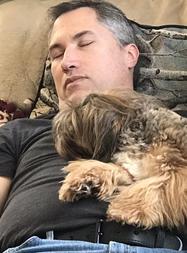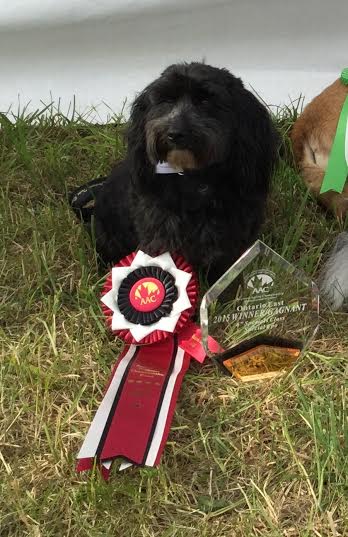Besides Havanese and our children, one of our passions is assisting those in need. Having raised children with special needs, having parents who suffered with both physical difficulties and Alzheimer's, and having an understanding of developmental disabilities as well as autism, PTSD, brain injury, trauma etc, our passion is to specifically choose to use our own dogs, and give our puppies the very best start in life to provide them with the capacity to be trained and used as service dogs and therapy dogs.
The Havanese is such a tenderhearted breed, so attentive and willing to please. Each breeder selects for those characteristics which they find appealing. Some Havanese breeders select for 'show' temperament, some are beginning to select for barn hunt, nose work, agility etc. However, the primary considerations should ALWAYS be companions first. While we enjoy doing many things with our Havanese, we also attempt to select for stable temperaments and do puppy socialization and training in the first 8 weeks that will help them have a strong potential with additional training to be service dogs or therapy dogs.
Many of the puppies we have raised have gone on to become service dogs or therapy dogs. Some visit hospitals, some visit nursing homes, some are part of the reading program in schools. We have two of our pups that have moved on to become therapy dogs in a professional counseling setting. One of our dogs is an ambulance therapy dog.
What is the difference between a Service Dog, Therapy Dog or Emotional Support Dog?
Service dogs according to the ADA are trained specifically to do a task. This task may be picking up objects for a person in a wheelchair, alerting a person of a medical condition, notifying the deaf of a knock on the door or phone call etc. Autism service dogs may perform many different task depending on the needs of the person requiring service.
Therapy dogs are trained to offer comfort and assistance to others. They enter hospitals, nursing homes, schools etc. and bring emotional comfort, joy, and companionship to others. Therapy dogs can be certified by many different organizations, which qualify as a 'team' with their handler (person).
Emotional support dogs bring comfort and emotional help to their owners who may be struggling with mental health issues, PTSD, anxiety or any other array of emotional discomfort.
Our puppy raising program:
We believe in providing our puppies with the very best start in life. This helps them become strong, healthy, well adjusted adults. Everything we believe in helps to assist our puppies to get off to a good start to becoming certified service dogs and therapy dogs. We are thrilled to be a part of the process of families finding a loving companion that can also assist them or others. We feel that you can find within a dog just a hint of the unconditional love of God. It is our desire to help share this love with others. Havanese have a lovely way of expressing compassion and affection to others. They are trusting and like to bring happiness to others. They are generally just happy dogs and their presence lend well to helping to comfort and support those in need.
Our personal dogs bring comfort and support to our developmentally challenged and autistic children. They help identify and alert to the oncoming of asthma attacks, irregular heart beats, and low blood pressure. They provide pressure to overcome sensitivities to over stimulation and physical pain. They provide emotional comfort and support for those who are overwhelmed and overstimulated. They are very sensitive to the needs of each individual and what their current needs are.
1. Our adult dogs, the parents of our puppies, are screened for hearing, cardiac, patella, and eyes are checked and registered with OFA. Blood panels are taken to assure proper liver and kidney function. DNA diversity testing is ran on all breeding dogs. Titers are run to assure immunity to distemper, parvo and adenovirus, thus also assuring the parents are not over-vaccinated.
2. Parents are fed an all natural, nutritious food with no corn, wheat, soy, dyes or preservatives.
3. Breedings only take place when we have the time, energy and resources to provide for the care and attention a litter requires.
4. Breedings only take place when the potential mom is mature and ready to carry and raise a litter. After the age of two years we allow her to determine if/when she is ready. We do not force breed our girls, as sometimes they simply need additional time to mature. Sometimes they are over three years old before they determine they are ready to have babies. Their health and well-being is the most important to us.
5. Breedings are always well thought out. We consider the conformation, temperament, pedigree and DNA diversity of each potential litter in order to select for the highest quality of potential breeding.
6. Pregnant moms always sleep in bed with me. The dogs may rotate who's bed they sleep in, however, once pregnancy is about half way through, they then always sleep with me so I can keep a very close eye on them.
7. The last week of pregnancy the mom is never left alone, someone is always home with her.
8. I am always there for the birth to help and assist mom as needed, provide emotional support to her, and provide her with a warm, loving and supportive place to have her babies. The mom is allowed to choose where she desires to have her pups. Sometimes this means alone in a dark place with just the two of us snuggled in a bedroom corner. Sometimes this means in the middle of all the action. Sometimes this is in the whelping box. Often this means on our bed snuggled up on my lap.
9. Puppies are born and raised right among our family. Moms and babies are constantly attended to. Moms are provided with their favorite foods to provide them and their babies strength and healthy nutrition. Generally our new mama's prefer Fresh Pet the first few weeks. About the time the puppies are weaning the moms are also transitioning back to kibble.
10. Puppies are handled from birth. Starting at day 3 we begin Early Neurological Stimulation exercises. This provides with very specific handling exercises to introduce touch and activity in a safe and supportive manner even before the puppies eyes are open. They get lots of snuggling too!
11. Puppies are allowed to wean naturally. We allow the moms to determine when and how quickly they want to wean their puppies. We trust they know best. When the puppies begin having interest in the moms food, we make certain to provide the moms with plenty of soft kibble so the pups can join her meals if they desire.
12. We follow Puppy Culture protocol for raising puppies to be learners and explorers. We provide them with intentional experiences and also with passive enrichment from the time they are up on their feet. We attempt to provide them with experiences that they will encounter with their new families, sights, sounds, textures, etc.
13. Puppies are exposed to the principles of 7's. By 7 weeks they are exposed to a minimum of 7 surfaces, 7 eating bowls, 7 textures, 7 shapes of toys, 7 new places, 7 eating locations, 7 new challenges, 7 unique people (hats, beards, young, old, glasses, men, women, infants, toddlers).
14. Puppies are taught from a young age how to be touched all over, including face, eyes, ears, mouth, feet. They are taught to lay calmly on their back on our lap. These will help with grooming and calming your puppy.
15. Puppies are provided with many rotating activities to increase their abilities to think and function. They have a wobble board, activity gym, slide, balance beam, toys that rattle, roll, rock, squeak, crinkle, etc.
16. Puppies are introduced to our adult dogs and allowed to run and play with them. They learn good doggie behavior and how to approach and play with older dogs.
17. We watch each stage of development and provide appropriate teaching to help provide optimum development from each stage.
18. Lots of safe travel excursions are taken, allowing the puppies to get used to traveling in the car and meeting new people.
19. Many safe visitors come to greet the puppies and snuggle with them.
20. Puppies are ALWAYS in our home and among our family, day and night, until they go home. Puppies have several play pens which they rotate in to allow for access to all areas of the house. They are also allowed to play freely in each room of the house with supervision.
21. Puppies are loved and adored from before birth (snuggled and talked to in mommies tummy) until they day they leave for their new home.
22. Puppies are vet checked, microchipped, BAER hearing tested, and veterinary vaccinated prior to going home.
23. Puppies go home with a puppy book that includes lots of information about the breed, training, and getting off to a good start with your puppy as well as weekly pictures of your puppy as they grew, pedigree, health information on parents and puppy, and more. Puppies also go home with a familiar blanket and toy so they have a comforting smell from home to go with them.
24. I am available to answer any questions you may have for the lifetime of your puppy.
Therapy and Service Dogs



